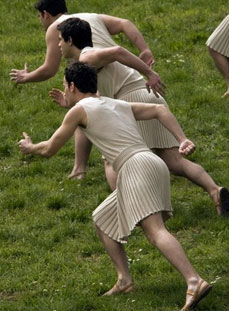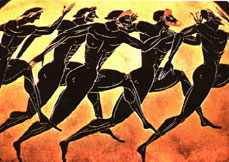

Ancient Greek Festivals - Introduction
Just about everyone is familiar with the ancient Olympic Games because of their revival in modern times. Less well known are the other three "crown" festivals of ancient Greece, those held at Delphi, Isthmia, and Nemea, not to mention local festivals that included athletic, equestrian, and musical contests. One of the most splendid of these local festivals was that held in Athens every four years in honor of the city's patron goddess Athena. Called the greater 'All-Athenian" o r Panathenaia, this week-long religious and civic celebration was the highlight of the city's festival calendar. Its various contests, processions, sacrifices, and other activities involved all the residents of Athens not just adult males but also women, children, metics (resident aliens), foreigners, and even slaves.
The Panathenaic games were distinctive, and no doubt especially popular with contestants, because of the valuable prizes to be won. Instead of the wreaths awarded at the prestigious crown festivals (Olympia: olive; Delphi: laurel; Isthmia: pine; Nemea: celery), most victors at the Panathenaia were awarded "cash" prizes consisting of olive oil in black-figured amphoras, or in the words of the 5th century B.C. poet Pindar, "in fire-baked clay the olive's fruit" (Nemean Ode 10). The decorated jar in which this oil was packaged always bore the official inscription, "one of the prizes from Athens", and is therefore called a Panathenaic prize amphora (2). This distinctive container became emblematic of the festival and as such appeared on the city's coinage, with an owl, symbol of Athena, perched on it.
